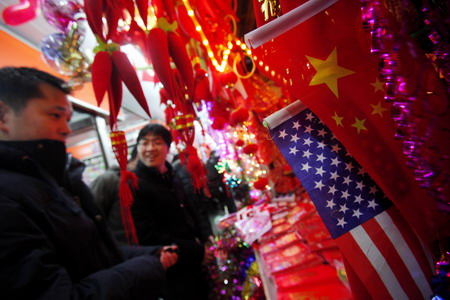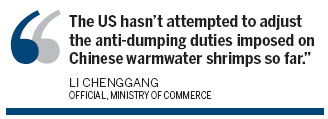|
2011-3-1
|

|
|
China has filed a complaint against the US with the World Trade Organization. Despite increasing trade volumes, the two countries have launched many actions against each other at the world trade body. [Photo / Reuters] | Nation says that "Zeroing" results in unfair trade assessments
BEIJING - China launched a litigation proceeding under the World Trade Organization (WTO) against the United States on Monday, urging the latter to remove what it says is an unfair method of calculating anti-dumping tariffs on warmwater shrimp exported from China.
"If the WTO's final ruling is in China's favor then the tariff rate imposed by the US on the shrimp shipments will be reduced. The US has inaccurately evaluated the average price of exported shrimp," Li Chenggang, director of the Department of Treaty & Law at the Ministry of Commerce, said.

The US uses an evaluation system called "Zeroing", whereby the domestic price of a certain product is compared with its import price to the US and then adjusted to account for transportation and handling costs.
According to the Ministry of Commerce, this method ignores the premium export price of a product, simply setting it at zero instead and leading to an imbalance. After a series of complaints from trade partners, the US announced in December that it would no longer use the method in it assessment of alleged dumping.
"The US hasn't attempted to adjust the anti-dumping duties imposed on Chinese warmwater shrimps," Li said, adding that China will settle attempt to settle the dispute through WTO.
"Once the cancellation of zeroing was approved officially, it should have applied to all global trade cases," Zhang Aiqing, a former director of Department of Treaty and Law under the Ministry of Commerce, told China Daily.
Last year, the anti-dumping duty on Chinese exported warmwater shrimp was reduced to between 5.07 percent and 8.45 percent, after the China appealed to the US International Trade Commission.
According to the ministry, Chinese exports of shrimp to the US have been hurt by the high tariffs since 2004 when the US began levying the duties, which then ranged from 27.89 percent to 82.28 percent.
In 2004, exports of Chinese warmwater shrimps to the US were worth $380 million. After the imposition of higher duties, shrimp exporters in Liaoning, Fujian, and Guangdong provinces saw business decline, making the case the most serious against China's aquaculture products.
It is not the first time that the US has been taken to the Dispute Settlement Panel over its evaluation of dumping.
Brazil, the world's largest exporter of orange juice, won a WTO ruling in a trade dispute, after it complained about an inaccurate tariff rate due to the zeroing.
"China should strengthen its trade-remedy mechanism as part of an effort to meet the challenges brought by the trade protectionism, which is gaining ground in a global market still suffering economic turmoil," said Zhou Shijian, a senior researcher with the Center for US-China Relations at Tsinghua University.
Since late 2008, China has been a major target of trade protectionism worldwide. In 2009, trade partners filed 27 cases against China, the largest number ever.
"We have made great strides in standing up for China's interests by initiating various trade-remedy measures," said Yang Yi, director of the bureau of industry injury investigation of the Ministry of Commerce, at a forum in December last year.
source:China Daily
|

 浙公网安33010602010414
浙公网安33010602010414